Kara Hospital works with WHO to provide quality care for all
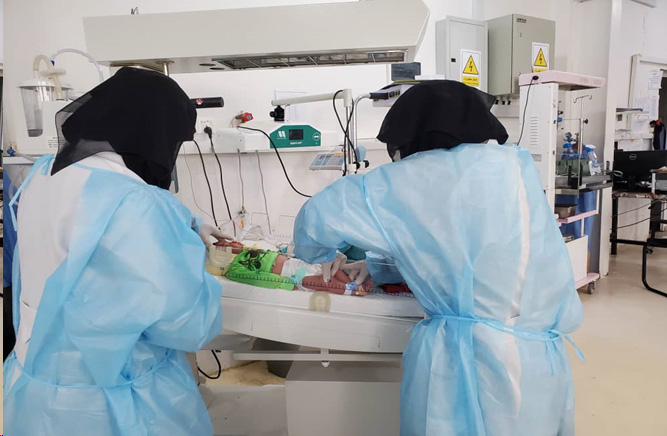 4 September 2024, Marib, Yemen – Kara Hospital is a critical health service provider for over 2 million people from Marib and neighbouring governorates such as Al Bayda, Al Jawf and Shabwah. Having opened its doors in 2010, it was upgraded to a governorate hospital in 2017.
4 September 2024, Marib, Yemen – Kara Hospital is a critical health service provider for over 2 million people from Marib and neighbouring governorates such as Al Bayda, Al Jawf and Shabwah. Having opened its doors in 2010, it was upgraded to a governorate hospital in 2017.
Its strategic location on the main road between Yemen and Saudi Arabia makes it a critical first responder to road traffic injuries. The hospital also provides a wide range of services, including general emergency care, various surgical services, and maternal and child health services, as well as outpatient services. It does this in a context of thousands of people having been internally displaced to Marib by the war and amid damage to other health facilities.
In 2023, Kara Hospital took significant strides to enhance its quality of care by creating a dedicated quality team. With WHO’s support, the hospital assessed and improved its compliance with national quality standards, achieving an impressive 86% compliance rate. The Minister of Public Health and Population recently recognized the hospital’s dedication to quality and patient safety with an award.
Kara Hospital’s quality team has worked to enhance infection prevention and control; set up a central sterilization department; and formed a committee for continuous improvement, based on the local burden of morbidity and mortality.
The hospital has focused on efficient medical waste management; regular workforce training; and patient rights, ensuring high-quality, respectful care. A culture of accountability has been promoted through regular audits, departmental competitions to uphold quality standards, and community engagement through health awareness campaigns.
These efforts have led to substantial community trust, and support from local authorities to enhance hospital infrastructure. A maternal and child health building, an administrative building and a power station have been added, and extensive landscaping efforts made.
The hospital’s dedication to quality care is clear from its service use figures. In 2023, it was responsible for about 100 000 outpatient visits, mostly from women and girls; 55 000 emergency department visits; 10 000 inpatient admissions; and 10 000 births.
With the support of WHO, the community and local authorities, Kara Hospital has become a pillar of quality health care provision in Marib – both for internally displaced people and host communities.
WHO supports quality of care capacity-building in this hospital as part of the Emergency Human Capital Project implemented in partnership with the World Bank.
Enhancing quality of care in Yemen’s health sector
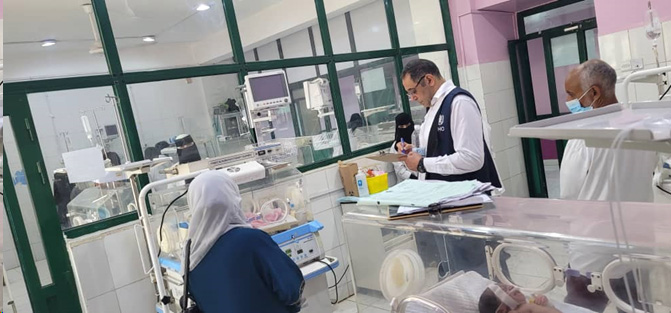 4 September, Aden, Yemen – Access to quality health care can mean the difference between life and death for patients.
4 September, Aden, Yemen – Access to quality health care can mean the difference between life and death for patients.
WHO Representative to Yemen Dr Arturo Pesigan explained: “In low- and middle-income countries such as Yemen, as many as 1 in 4 hospitalizations result in harm and 1 in 24 people die from unsafe care. This is a serious situation that needs to be addressed through action to strengthen the health system.”
Under the Emergency Human Capital Project (EHCP), supported by the World Bank, WHO provides holistic support to the authorities to enhance quality of care in Yemen’s health sector. This support began with training more than 2000 senior health workers on hospital care and management from 2019 onwards under the Emergency Health and Nutrition Project (EHNP), the predecessor project to EHCP.
Collaboration on quality of care has been significantly scaled up under the leadership of Minister of Public Health and Population His Excellency Dr Qasem Buhaibeh, who sees quality of care as a flagship ministerial initiative.
Said Dr Buhaibeh: “In collaboration with WHO, we have endorsed national quality standards, we have trained more than 400 health workers in applying these standards to their work, and developed improvement plans at all hospitals in the southern governorates to improve compliance.”
Read the success stories below to learn about the excellent progress made by 5 hospitals in Yemen to improve quality of care.
Related links
World Patient Safety Day 2023: “Engaging Patients for Patient Safety” takes center stage in Yemen
Striving for the right to health and sustainable development in Yemen
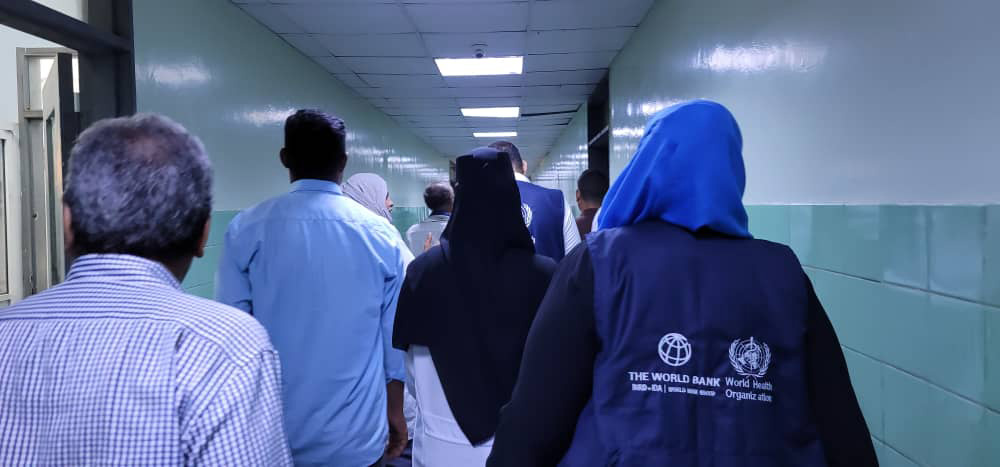 Doaa Shihab, WHO Technical Officer conducts a field visit to Al Jomhoria Hospital in Aden, an EHCP supported facility. Photo credit: WHO Yemen/ A. Abdulqawi21 August 2024, Aden and Sana’a, Yemen – WHO is championing the right to quality health services for everyone, everywhere. In Yemen, despite immense efforts from all partners, this right is yet to be realized.
Doaa Shihab, WHO Technical Officer conducts a field visit to Al Jomhoria Hospital in Aden, an EHCP supported facility. Photo credit: WHO Yemen/ A. Abdulqawi21 August 2024, Aden and Sana’a, Yemen – WHO is championing the right to quality health services for everyone, everywhere. In Yemen, despite immense efforts from all partners, this right is yet to be realized.
People in Yemen have lived through a decade of conflict. Although there have been some moves towards peace, the political, economic and social contexts are still precarious. Standing by WHO in seeking to enhance health services to achieve better population well-being is the World Bank. It has provided WHO with financial support and technical collaboration to ensure that the backbone of Yemen’s health system remains intact.
The partnership between WHO and the World Bank in Yemen began in 2017, with the Emergency Health and Nutrition Project (EHNP). In 2021, EHNP was replaced by the Emergency Human Capital Project (EHCP), which is still ongoing. In addition, the Yemen COVID-19 Response Project (2020–2022) provided life-saving support during the COVID-19 emergency. It also led to lasting health system improvements in Yemen.
As a successor project, EHCP continues essential interventions started under EHNP, including to deliver fuel for electricity, plus oxygen, medicines and other supplies to about 100 hospitals across Yemen. EHCP also aspires to shift efforts across the humanitarian–development–peace nexus, towards building sustainable institutional and individual capacities that strengthen Yemen’s health system and human capital.
EHCP delivers in 3 key areas: health, nutrition, and water, sanitation and hygiene (WASH). WHO implements the project with the United Nations Children’s Fund (UNICEF) and the United Nations Office for Project Services (UNOPS), working with the authorities in Yemen.
Minister of Public Health and Population Dr Qasem Buhaibeh explained: “EHCP really is a lifeline for the health sector, from which millions of Yemenis benefit. To make the most of this project, we are increasingly focusing on enhancing the quality of care and building local capacities so that the gains we have made can be sustained in future.”
Through the project, WHO and UNICEF can support service delivery at more than 2400 health facilities. The agencies have worked with more than 12 000 health professionals to enhance their skills through capacity-building activities.
WHO Representative to Yemen Dr Arturo Pesigan described the impact of the project: “Under EHCP so far, about 13 million people have received essential health, nutrition and WASH services, including 7 million women, 4 million children and 620 000 pregnant women.”
In WHO, interventions under EHCP are implemented within the broader framework of the Yemen–WHO Country Cooperation Strategy 2024–2025. This aligns with the United Nations Yemen Sustainable Development Cooperation Framework 2022–2024.
The funding outlook for Yemen continues to be uncertain, as donors are prioritizing crises in other parts of the world. An injection of additional resources will be critical for EHCP activities to continue. All the while, WHO, UNICEF and UNOPS are working with Yemen’s authorities to identify ways to increase project efficiencies and maximize the sustainable impacts of activities.
Related links
The World Bank and WHO in Yemen, 2017–2022: preventing collapse, building resilience
Yemen: daily battles against poverty and hunger
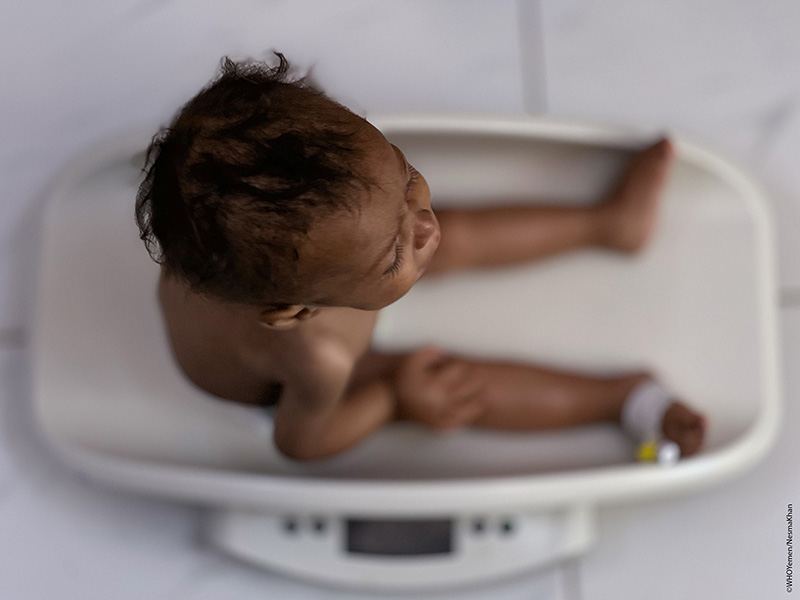 28 August 2024, Aden, Yemen – Mohamed Khalil a 2-year-old boy from Al-Khawkhah district in Hodeida, suffers from severe acute malnutrition with medical complications. His belly is swollen and his body is frail. When he began vomiting every time he ate, his mother scraped together what money she could from family and friends and took him to Al-Saddaqa Hospital in Aden.
28 August 2024, Aden, Yemen – Mohamed Khalil a 2-year-old boy from Al-Khawkhah district in Hodeida, suffers from severe acute malnutrition with medical complications. His belly is swollen and his body is frail. When he began vomiting every time he ate, his mother scraped together what money she could from family and friends and took him to Al-Saddaqa Hospital in Aden.
Mohamed’s mother has 4 children, the youngest just 4 months old. She struggles to feed her family. As the prices of basic food items continue to rise, it becomes daily more difficult to make ends meet. “The cost of living is becoming unbearable. We can barely afford enough food for everyone," she says.
Despite these hardships, she is determined that Mohamed gets the care he needs.
"The doctors at the hospital are kind. They provide milk for free, medicines, lab investigations, and meals for me but we still need to pay for additional specialized tests. I don’t know how we will manage. I just want my son to get healthy, but it’s distressing when I can’t afford everything he needs.”
The August 2024 Integrated Food Security Phase Classification (IPC) report revealed that 50% of the population in Yemen’s southern governorates face acute food insecurity. The situation is exacerbated by reduced humanitarian aid and economic decline. The depreciation of the Yemeni Riyal has increased fuel prices and compounded already limited access to food.
The high prevalence of diseases such as cholera and measles, limited access to safe water, and inadequate sanitation contribute to worsening nutritional and medical conditions, while the displacement of populations and loss of livelihoods due to conflict place additional strains on Yemeni families.
Faiza Al-Maktari, a nurse in the nutrition department at Saddaqa Hospital, represents hope for families desperately seeking care for their children. Faiza says her work blends joy and sadness and speaks of “holding a frail baby and watching them recover” as akin to “witnessing a small miracle”.
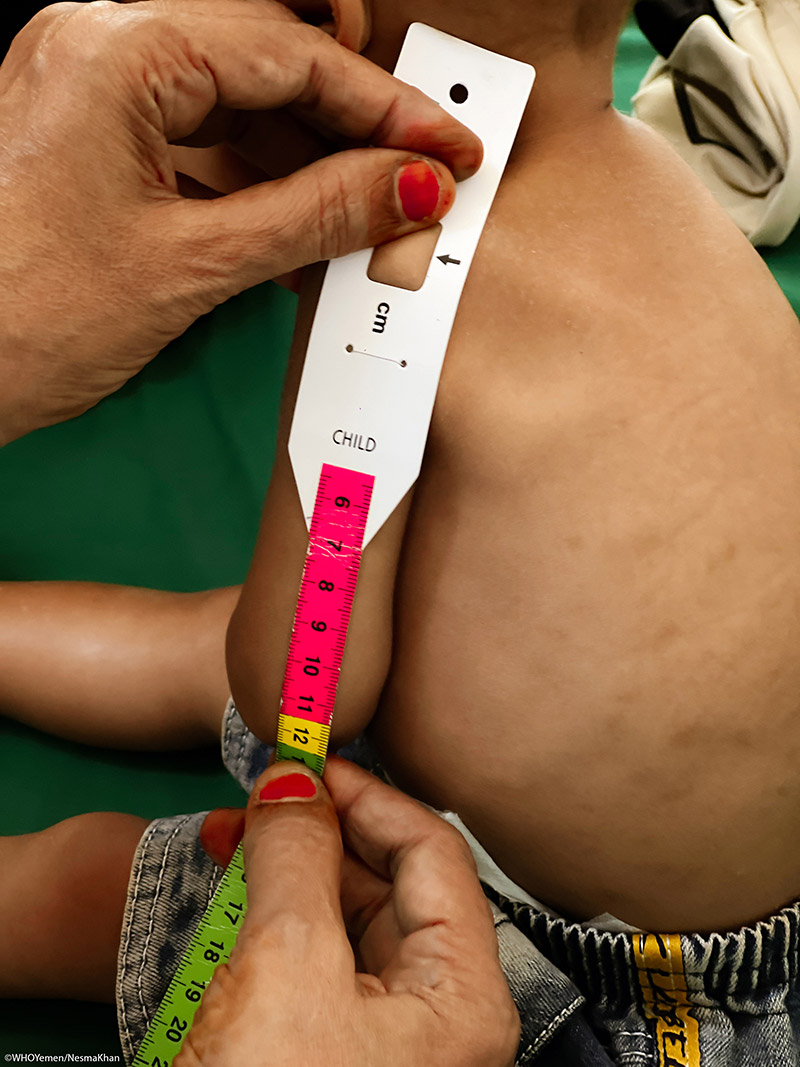 Her department is stretched to breaking point as increasing numbers of malnourished children from nearby governorates, especially the West Coast region, strain essential supplies, leaving the staff to cope with decreasing resources. Despite the challenges, Faiza remains undeterred. She dedicates time to comforting anxious mothers, offering a listening ear and kind words.
Her department is stretched to breaking point as increasing numbers of malnourished children from nearby governorates, especially the West Coast region, strain essential supplies, leaving the staff to cope with decreasing resources. Despite the challenges, Faiza remains undeterred. She dedicates time to comforting anxious mothers, offering a listening ear and kind words.
“I try to give them hope,” she says. “Sometimes, a little kindness goes a long way.”
The 7 supported therapeutic feeding centres (TFC), 4 of them embedded in pediatric wards, operating in regions with high malnutrition rates, high levels of internal displacement and severe food insecurity, provided lifesaving services to over 5129 children between October 2023 and July 2024, addressing acute malnutrition cases with serious co-morbidities.
The TFCs offer round-the-clock, lifesaving health and nutrition care for severely malnourished children. Sustaining these services is vital to saving children’s lives. To alleviate the financial burden on families, caregivers receive cash support for transportation, and three meals a day during the admission period, and the costs of lab tests and admission kits are fully covered.
Faiza dreams of a Yemen where no child goes hungry, and families find stability and peace.
“I’m grateful to be here, to help any way I can,” she says. “But I long for a future where our work isn’t so desperately needed.”
Leaving the hospital each day, Faiza carries with her the memories of those she has helped and those she has lost. The memories fuel her resolve to return, day after day, striving to make a difference.
“It’s never easy, but I won’t give up. Not now, not ever.”
In collaboration with the European Civil Protection and Humanitarian Aid Operations (ECHO), WHO is dedicated to enhancing child health and well-being while reducing mortality and morbidity through a protective, integrated approach. WHO supports 101 therapeutic feeding centres across Yemen, covering approximately 80% of the target caseload in the country.
WHO assists the Ministry of Public Health and Population and other partners by providing technical capacity building for case management and supplying essential medical supplies, including pediatric and severe acute malnutrition kits.


